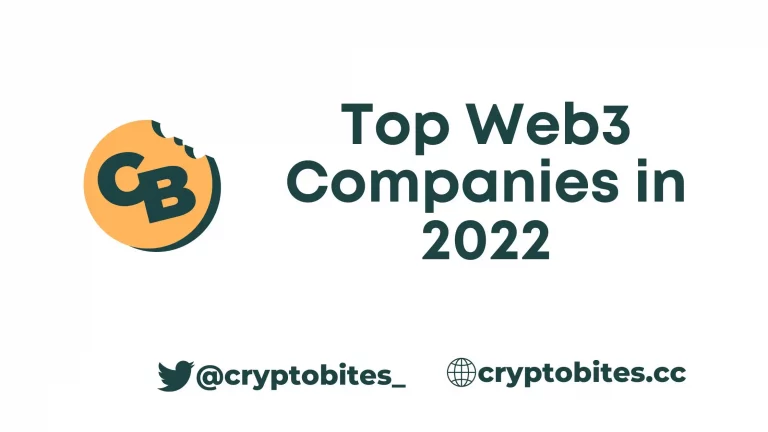
The Biggest web3 Companies
While Gavin Wood presented the idea of Web3 in 2014, the concept only became mainstream in 2021 with the expansion of NFT and crypto markets. Its customer-centric approach led to the large-scale integration of Web3 dAPP (decentralized application) in giant corporations, as the market is expected to soar to $23.3 Billion by 2028.
This article breaks down Web3 and what it means for businesses. Then, we list the ten biggest Web3 companies revolutionizing the game with AI, machine learning, cryptocurrencies, NFTs, and blockchain.
What is Web3?
Web2 made the internet more interactive by introducing social media. However, the handful of corporations controlling vast amounts of user data raised concerns regarding the potential abuse of collected personal information.
In 2014, Ethereum’s co-founder Gavin Wood introduced the idea of Web3, which is based on incorporating blockchain technology and AI to decentralize the webspace.
Web3 is based on the following key features:
- Decentralization: Web3 adopts blockchain technology that stores data as numbers in multiple blocks instead of a few large databases, as with Web2. This transfers control of user data to several trusted authorities.
- Permissionless: Web3 makes the internet space permissionless. This means allowing the users to interact without any interference from intermediaries.
- Integration Of Artificial Intelligence: Web3 incorporates machine learning and AI for natural language processing that simplifies SEO.
- Connectivity and Accessibility: Web3 aims to make the internet accessible to everyone by making it available on all smart devices. In addition, it also promises inclusion and accessibility to all, regardless of the user’s physical abilities.
10 Top Web3 Companies 2022
Here are the ten biggest blockchain companies you should know of:
Braintrust
Founded in 2018, Braintrust is a first-of-its-kind talent network of over 700,000 people that bridges the gap between freelancers and brands. They primarily deal with machine learning, data analytics, software design, and related niches.
The decentralized working model allows the community to effectively vet out talent while also cutting the fee (and ownership) charged by intermediaries in traditional setups.
On average, Braintrust talent (known as knowledge workers) makes $100/hr while partnering with reputable project contributors. Currently, the platform is snowballing and has a market cap of $200 million as of July 2022.
NFTY Labs
Set up in 2020, NFTY Labs creates new, open-sourced tech for NFT structure to help brands and influencers join the Web3 space.
It essentially focuses on providing user-friendly authentication methods for blockchain that minimize potential data breaches. Other than that, the platform also works on fostering a better relationship between NFT owners and relevant companies.
Crypto.Com
With over 50 million users, Crypto.com is an established crypto trading platform supporting over 250 currencies. It enables decentralized buying and selling of cryptocurrencies by following safe, industry-standard methods.
While charging minimal fees (0.04 to 0.20%), Crypto.com offers you various benefits like five prepaid Visa cards, significant return on interest, gift cards, and phone top-ups.
Exclusible
Exclusible is a premium NFT marketplace that primarily focuses on luxury NFTs.
The platform aims to make it accessible for brands to tailor and sell their digital products to high-end NFT buyers. This is made possible by giving companies direct access to an exclusive list of potential collectors.
OpenSea
OpenSea is a NewYork-based Web3 platform currently valued at $13.3 billion. The company claims to be the largest digital marketplace for NFTs like domains, digital art, and gaming items.
This startup is funded by industry giants like Coinbase Ventures, Founders Fund, and Blockchain Capital. It is rapidly growing, and this is imminent from the whopping 1,631% increase in OpenSea’s workforce over the past two years.
Sorare
If you are an NFT collector enthusiastic about football, Sorare is your one-stop shop. The platform allows users to create a fantasy football team, participating in virtual leagues while earning prizes, gift cards, and money.
Launched in 2019, Sorare has partnered with some of the leading football and baseball associations, which explains how the card sales have exceeded over $80 million in just three years.
Ripple
Ripple or Opencoin is a San Francisco-based company that provides a secure and transparent global network for the transaction of cryptocurrencies. Funded by 41 investors, the platform caters to customers from over 40+ countries.
According to PrivCo, Ripple’s post-money valuation is over $10 Billion as of 2019.
Coin List
Starting in 2017, the Coin List has gained rapid popularity as a global leader in token issuance. The company deals with crypto investment and provides one platform for token trading and all crypto-specific services.
Binance
With over 90 million global customers, Binance is the largest crypto exchange platform. It allows the users to exchange electronic funds, which you can conveniently store in online crypto wallets (trust wallets).
The platform hosts the best developers and contributors from across the world. In addition, Binance has an online academy that shares detailed crypto knowledge in over 20 languages to facilitate users. It also provides research reports and data-based analysis to help customers make informed choices.
Spatial
Built in 2016, Spatial is a unique platform that empowers small-scale creators and high-end brands in creating a valuable online presence. The platform hosts a talented team of 3D design and AR/VR experts who help attract audiences and increase ROIs.
Spatial brings creators and potential customers closer as an online community, which makes it easy to sell /rent NFTs.
Conclusion
Web3 is considered the next big step in the evolution of digital space. The impact of blockchain technologies and the success of companies who have adopted the model means Web2 could become obsolete in a few years.
And for a decentralized future, the ten biggest Web3 companies listed in the write-up are a few of the first ones that have laid a strong foundation for this development.





Do you mind if I quote a couple of your articles as long asI provide credit and sources back to your website?My blog site is in the very same niche as yours and my users would certainly benefit from some of the information you present here.Please let me know if this okay with you. Thanks!
Sure